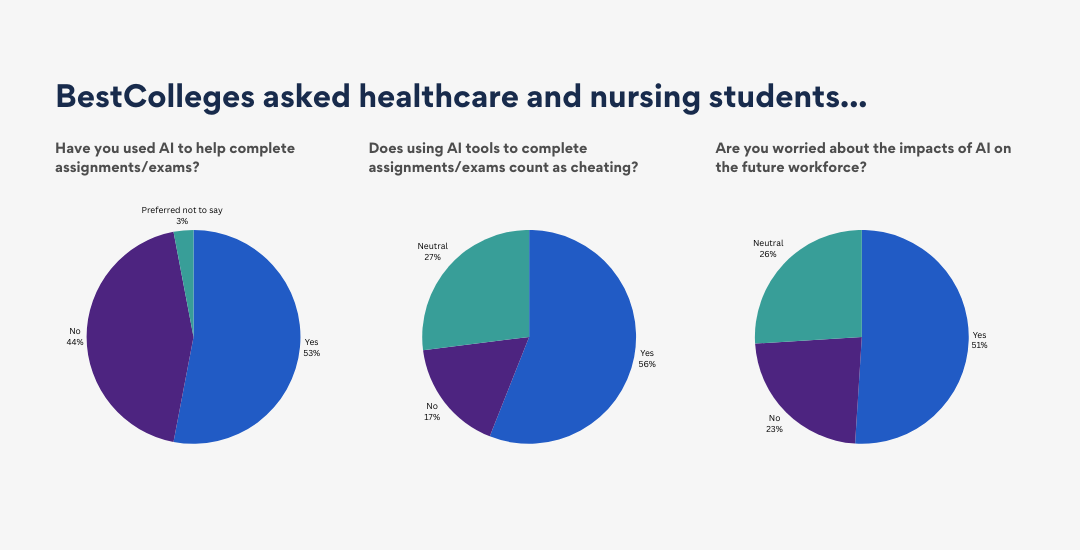
When it comes to using AI, nursing students trust themselves to use it correctly—but not their peers or administrators
When it comes to using AI, nursing students trust themselves to use it correctly—but not their peers or administrators
The worlds of healthcare and higher education tend to view artificial intelligence (AI) with equal parts optimism and skepticism. Using a BestColleges survey among 1,000 respondents nationwide who were currently enrolled in an on-campus, online, or hybrid undergraduate or graduate degree program, NurseJournal looked into attitudes about AI. The survey found that nursing students and other health professions students simultaneously trust themselves to use AI responsibly and harbor serious doubts about its benefits in the hands of others or healthcare practice as a whole.
Results of the survey found that just over half of nursing and other health professions students (53%) used generative AI tools like ChatGPT to complete assignments or exams. Meanwhile, a similar percentage of students in the same survey said using AI for those purposes should constitute cheating or plagiarism.
Perhaps even more tellingly, only 33% of health and nursing students said they would trust colleges to use AI to help make college admission decisions. An even lower 32% of students trusted colleges to use AI tools for more administrative tasks, such as sorting and processing.
On the job search, just 37% of health and nursing students agreed it was acceptable to use AI tools when completing applications, with 32% disagreeing and 31% staying neutral.
BestColleges, an education and career resource and planning website, is owned by Red Ventures, which also owns NurseJournal.
Ongoing Mistrust of AI
AI garners mixed feelings in many quarters; mistrust is not a new part of that mix. Among all college students responding to the BestColleges survey, 39% said using AI tools on job applications was acceptable, while 55% believed it would bring unfair advantages.
AI concerns go well beyond healthcare or higher education. A June 2023 survey from AI company Krista Software found widespread societal skepticism of AI on matters ranging from crime to Christmas shopping.
"From something as simple as picking a daily outfit to teaching school to writing laws — not to mention doing their own jobs — Americans aren't yet willing to allow AI to make decisions or work tasks where the outcome will potentially affect them," the Krista study authors wrote.
A study released in August by the Pew Research Center found that 52% of Americans felt more concerned than excited about the increased use of the burgeoning technology, while only 10% were more excited than concerned.
"Our previous analyses have found that Americans' concerns about AI include a desire to maintain human control over these technologies, doubts that AI will improve the way things are now, and caution over the pace of AI adoption in fields like health and medicine," the Pew researchers wrote.

Nursing and Health Students May Receive Less Exposure to AI
At the same time, students across the board seem to be embracing AI for their own purposes despite any potential concerns over unfair advantages. Among all the undergraduate and graduate students who responded to the BestColleges survey, 56% reported using AI on assignments or exams, compared with 41% who had not and 4% who preferred not to answer.
Just over half of health and nursing students (53%) reported using AI to help complete assignments or exams, while 44% did not, and 3% preferred not to say. At the same time, more than half of health and nursing students (56%) said that using AI tools to complete assignments or exams counts as cheating or plagiarism, with 17% disagreeing and 27% staying neutral.
Many nursing and health student survey respondents reported receiving some form of exposure to AI as part of their education — though statistically not as much as their counterparts in the general population.
Just less than half of nursing and health professions students (49%) reported receiving assignments that required the use of AI, while roughly 7 in 10 health and nursing students (73%) said at least one instructor discussed the use or ethics of AI in the classroom.
These numbers lag behind those found among general undergrad and graduate respondents in the BestColleges survey, where 53% of students had coursework requiring AI, and about 8 in 10 (79%) received instruction on the use and ethics of AI in the classroom.
This may not come as a shock to nursing school faculty, who have long stated a need for schools to keep faculty more current in technological competencies.
More than half of health and nursing students (51%) say they're worried about the impacts of AI on the future workforce. Less than a quarter (23%) disagreed, while 26% remained neutral.
This story was produced by NurseJournal and reviewed and distributed by Stacker Media.



